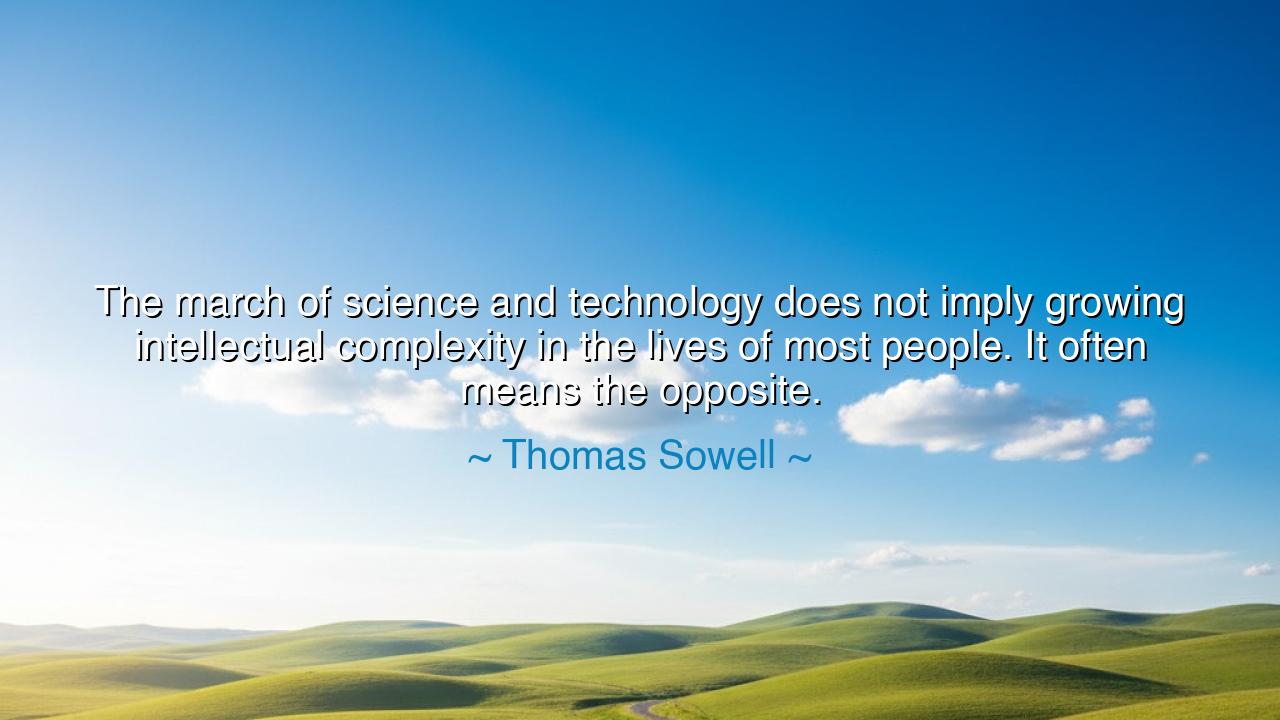
The march of science and technology does not imply growing
The march of science and technology does not imply growing intellectual complexity in the lives of most people. It often means the opposite.






“The march of science and technology does not imply growing intellectual complexity in the lives of most people. It often means the opposite.” So spoke Thomas Sowell, a thinker whose words often cut through the illusions of progress to remind us of the truths that lie beneath. His voice tells us that the advance of science and technology, though mighty and dazzling, does not always bring deeper wisdom to the masses. Instead, it may strip away struggle, reflection, and understanding, replacing them with ease and passivity. What seems like progress in power may be decline in thought.
The origin of these words comes from the observation of modern society. In ancient times, to light the night required labor—wood gathered, fires kindled, flames tended. Each task carried knowledge of nature, patience, and skill. Today, a flick of the switch fills the room with light, and the ancient understanding is lost. So too with food, once grown in the sweat of the brow, now summoned from machines and markets. As technology advances, the individual’s need to understand the processes of life diminishes. Sowell warns us: this does not make men wiser, but often simpler, more detached from the truths that sustain existence.
History bears witness to this paradox. Consider the fall of Rome. The empire grew rich with engineering, aqueducts, and roads. Citizens of the capital bathed in waters brought from distant mountains, enjoyed food shipped from afar, and marveled at spectacles in the arena. Yet while the empire’s technology flourished, the civic discipline of its people declined. Fewer understood the hard labors of farming or war. When the barbarians pressed at the gates, Rome had knowledge on parchment, but not in the lives of its people. Luxury had dulled wisdom, and simplicity had crept in where once there was resilience.
The same can be seen in the story of the Industrial Revolution. Machines multiplied human strength a hundredfold, but they also severed men from the knowledge of craft. Where once a shoemaker knew every detail of his art, now many worked in factories pressing a single button or tending a single gear. Production soared, yet human understanding shrank. Sowell’s words remind us that the march of science and technology often reduces the complexity of life for individuals, until they depend wholly on systems they cannot explain and powers they cannot control.
Yet this truth is not spoken to condemn science, but to call for vigilance. For science is a gift, and technology is a tool, but they must be used with wisdom. To embrace them blindly is to walk into dependency; to master them with understanding is to preserve freedom. The wise man does not reject the light switch, but he remembers the fire. He does not scorn the machine, but he remembers the craft. He does not despise abundance, but he remembers the cost of survival. This balance is the heart of wisdom.
The ancients knew this balance well. In the East, Lao Tzu taught that progress without harmony leads to decline, that complexity outside can mean emptiness within. In the West, the Stoics warned against mistaking possessions for strength, reminding men that true power lies in character, not in invention. Sowell’s voice continues this ancient counsel: the greater the outer march of science, the more carefully we must guard the inner march of the mind.
So, O listener, take this lesson into your days: use the gifts of modern technology, but do not let them rob you of understanding. Learn not only how to consume, but how to create. Ask not only what machines can do, but what you yourself can know. Read deeply, reflect daily, and train your mind to grow, lest ease dull it. For the march of science may indeed simplify your life, but it is your task to ensure it does not simplify your soul.






AAdministratorAdministrator
Welcome, honored guests. Please leave a comment, we will respond soon